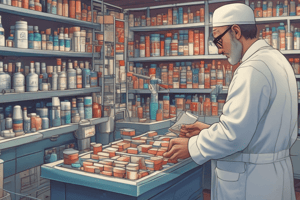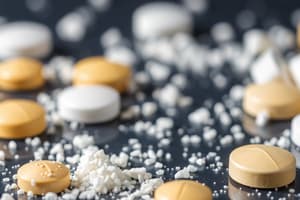Podcast
Questions and Answers
What distinguishes tablets from other pharmaceutical dosage forms?
What distinguishes tablets from other pharmaceutical dosage forms?
Tablets are solid unit dosage forms that contain medicaments, which can be combined with excipients, and are specifically prepared through methods like compression or molding.
Describe the role of excipients in tablet formulation.
Describe the role of excipients in tablet formulation.
Excipients serve as inactive substances that help in the manufacturing process, enhance stability, and aid in the delivery of the active medicament within tablets.
Identify two common methods used to prepare tablets and briefly explain them.
Identify two common methods used to prepare tablets and briefly explain them.
Tablets are prepared by either compression, which involves applying pressure to a powder mixture, or molding, where the mixture is shaped in a mold before solidifying.
What is meant by 'solid unit pharmaceutical dosage form' in the context of tablets?
What is meant by 'solid unit pharmaceutical dosage form' in the context of tablets?
How does the preparation method of tablets influence their pharmacological effectiveness?
How does the preparation method of tablets influence their pharmacological effectiveness?
Flashcards are hidden until you start studying
Study Notes
Tablet Characteristics
- Tablets are solid dosage forms, usually containing medicinal substances with or without excipients.
- They are typically designed for oral administration.
- Tablets offer several advantages over other dosage forms, including ease of administration, accuracy of dosage, portability, and relatively long shelf life.
Role of Excipients
- Excipients are non-medicinal components added to tablet formulations.
- They play critical roles in tablet manufacturing and performance, such as:
- Binding: Holding the tablet together.
- Disintegration: Facilitating the breakdown of the tablet in the gastrointestinal tract.
- Lubrication: Preventing sticking to machinery.
- Flavoring: Improving palatability.
- Coloring: Making the tablet easier to identify or masking the color of the active ingredient.
Tablet Preparation Methods
- Direct Compression: A simple method where the active ingredient and excipients are directly compressed into tablets. This method is suitable for materials that are readily compressible.
- Granulation: A more complex process that involves wetting the powder mixture with a liquid binder and then drying it to form granules. Granulation improves the flowability and compressibility of the powder mixture, making it easier to form tablets.
Solid Unit Dosage Form
- Tablets are considered "solid unit pharmaceutical dosage forms" because they are solid, pre-determined doses of medication, making it easier to administer and control the dosage.
Impact of Preparation Method on Effectiveness
- The preparation method can significantly affect the pharmacological effectiveness of a tablet:
- Dissolution Rate: The rate at which the tablet dissolves and releases the active ingredient in the body. A slower dissolution rate can delay the onset of drug action, while a faster dissolution rate can lead to rapid absorption and a shorter duration of action.
- Bioavailability: The extent to which the active ingredient is absorbed into the bloodstream and becomes available to reach its target site. The preparation method influences the bioavailability of the drug by impacting its dissolution rate and absorption.
Studying That Suits You
Use AI to generate personalized quizzes and flashcards to suit your learning preferences.




